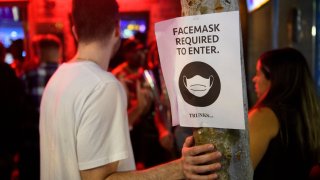
Face mask signage is displayed outside the Trunks bar after midnight early Sunday morning on July 18, 2021 in West Hollywood, California.
- The CDC recommended that fully vaccinated people begin wearing masks indoors again in places with high Covid transmission rates.
- The updated guidance comes ahead of the fall, when the delta variant is expected to cause another surge in new coronavirus cases and many large employers plan to bring workers back to the office.
- Experts say Covid prevention strategies remain critical to protect people from the virus, especially in areas of moderate-to-high community transmission levels.
The Centers for Disease Control and Prevention recommended Tuesday that fully vaccinated people begin wearing masks indoors again in places with high Covid-19 transmission rates. The agency is also recommending kids wear masks in schools this fall.
Federal health officials still believe fully vaccinated individuals represent a very small amount of transmission. Still, some vaccinated people could be carrying higher levels of the virus than previously understood and potentially transmit it to others.
Get top local stories in Philly delivered to you every morning. Sign up for NBC Philadelphia's News Headlines newsletter.
"This pandemic continues to pose a serious threat to the health of all Americans," CDC Director Rochelle Walensky told reporters on a call. "Today, we have new science related to the delta variant that requires us to update the guidance regarding what you can do when you are fully vaccinated."
The updated guidance comes ahead of the fall season, when the highly contagious delta variant is expected to cause another surge in new coronavirus cases and many large employers plan to bring workers back to the office. In mid-May, the CDC said fully vaccinated people didn't need to wear masks in most settings, whether indoors or outdoors.
"In areas with substantial and high transmission, CDC recommends fully vaccinated people wear masks in public, indoor settings to help prevent the spread of the delta variant, and protect others. This includes schools," Walensky said. The CDC recommends that everyone in grade schools wear masks indoors, "including teachers, staff, students and visitors, regardless of vaccination status."
Money Report
Walensky said new data shows the variant behaves "uniquely differently from past strains of the virus," indicating that some vaccinated people infected with the delta variant "may be contagious and spread the virus to others."
Read More: Americans will need masks indoors as U.S. heads for 'dangerous fall' with surge in delta Covid cases
Health experts fear delta, already the dominant form of the disease in the U.S., is hitting states with low vaccination rates. Those states are now being forced to reintroduce mask rules, capacity limits and other public health measures that they've largely rolled back in recent months.
White House chief medical advisor Dr. Anthony Fauci said Sunday that the CDC was considering whether to revise mask guidance for vaccinated Americans, saying it was "under active consideration."
"It's a dynamic situation. It's a work in progress, it evolves like in so many other areas of the pandemic," Fauci, also the director of the National Institute of Allergy and Infectious Diseases, told CNN. "You've got to look at the data."
The CDC's guidance is only a recommendation, leaving it up to states and local officials on whether to reintroduce their mask rules for certain people. But even before the CDC's anticipated guidance Tuesday, some regions were reintroducing mask mandates and advisories as Covid cases began to spike again.
Walensky said a majority of the hospitalizations and deaths in the U.S. are occurring among unvaccinated people, pointing to vaccines she said worked well in protecting against severe illness and death. "But the big concern is that the next variant that might emerge, we're just a few mutations potentially away where it could potentially evade our vaccines," she said.
President Joe Biden said the CDC's updated guidance was necessary to defeat the virus, and that he will lay out "next steps" to get more Americans vaccinated on Thursday.
"Although most U.S. adults are vaccinated, too many are not. While we have seen an increase in vaccinations in recent days, we still need to do better," he said in a statement. "More vaccinations and mask wearing in the areas most impacted by the Delta variant will enable us to avoid the kind of lockdowns, shutdowns, school closures, and disruptions we faced in 2020."
Several counties across California and Nevada were already advising all residents to wear masks in public indoor settings — whether they are vaccinated or not. In Massachusetts, officials in Provincetown advised all individuals to resume wearing masks indoors after Fourth of July celebrations led to an outbreak of new cases.
Experts say Covid prevention strategies remain critical to protect people from the virus, especially in areas of moderate-to-high community transmission levels.
The CDC defines "substantial transmission" as counties that have 50 to 100 cases per 100,000 residents over a seven-day period and "high transmission" is more than 100 cases per 100,000 people over seven days, Walensky said.
"We have places and counties and states here that are now reporting over 300 cases per 100,000 over a seven day period. So really an extraordinary amount of viral transmission, which is what we're concerned about," she added.
Dr. Paul Offit, a pediatrician and vaccine advocate who has served on advisory panels for both the CDC and the Food and Drug Administration, told CNBC earlier this month that the U.S. was still "undervaccinated," with about half of the population not fully inoculated.
Even people who are fully protected have cause for concern when it comes to Covid variants, Offit said. While the vaccines protect well against severe disease and death, they may not protect as well against mild disease or spreading Covid to others, he said. No vaccine is 100% effective, he noted.
"It is not a bold prediction to believe that SARS-CoV-2 is going to be circulating two or three years from now. I mean there are 195 countries out there, most of which haven't been given a single dose of vaccine," Offit said. "Will it still be circulating in the United States? I think that would be very, very likely."
Israel released preliminary data last week that showed the Pfizer vaccine is just 39% effective against the virus there, which officials attributed to the rapidly spreading delta variant. Its effectiveness against severe disease and death remained high, the data showed. U.S. and world health officials said they are looking at the Israeli research, which was not peer-reviewed and was scant on details.
Executives from Pfizer, Moderna and Johnson & Johnson have said they expect Americans will need booster shots, and Pfizer has said it plans to ask the FDA to authorize boosters as it sees signs of waning immunity. Federal health officials say booster doses of the vaccines are not needed for otherwise healthy people at this time, although they may recommend it for the elderly or people with compromised immunity.
– CNBC's Meg Tirrell and The Associated Press contributed to this report.






